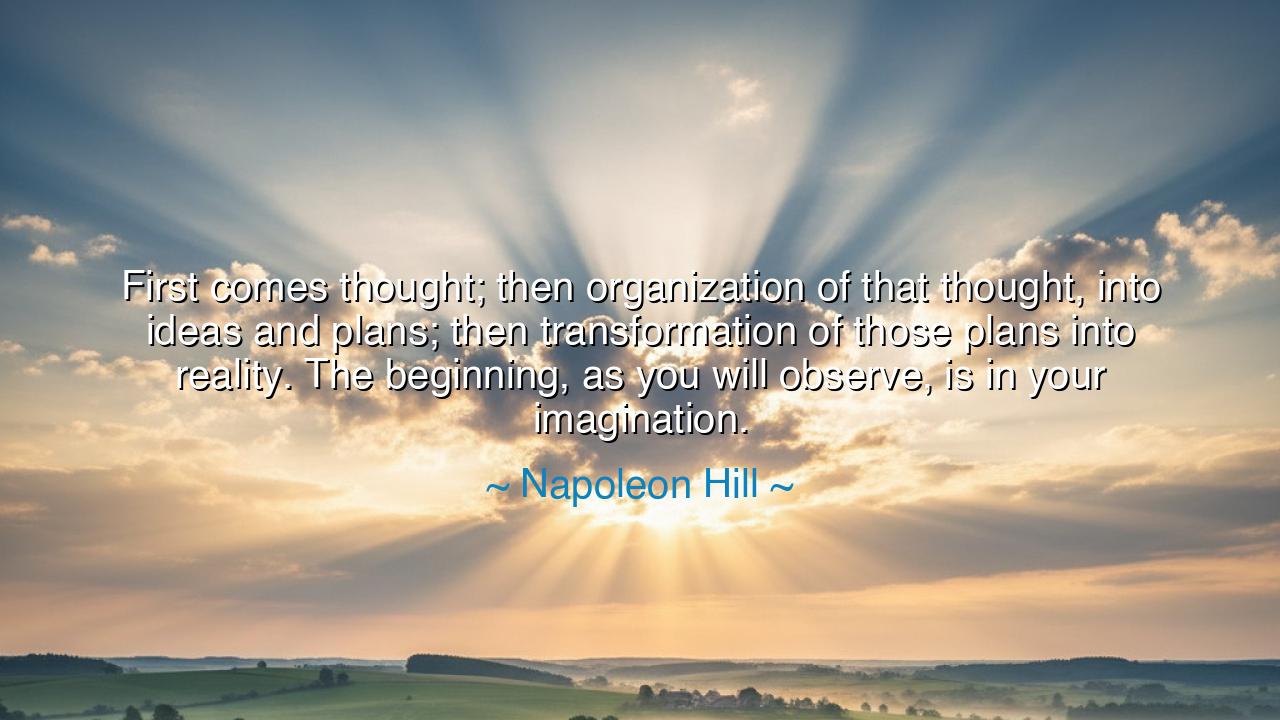
First comes thought; then organization of that thought, into
First comes thought; then organization of that thought, into ideas and plans; then transformation of those plans into reality. The beginning, as you will observe, is in your imagination.






In the timeless and electrifying words of Napoleon Hill, the philosopher of ambition and architect of the modern creed of success, we are given a map to the kingdom of creation: “First comes thought; then organization of that thought, into ideas and plans; then transformation of those plans into reality. The beginning, as you will observe, is in your imagination.” Within these lines lives the law of all human achievement — the divine sequence by which dreams are forged into destiny. Hill speaks not only of material triumph but of the eternal process by which the unseen becomes seen, the formless becomes form. All creation — whether of empire, art, invention, or virtue — begins in that sacred fire of the mind: imagination.
To understand his wisdom, one must first see thought as the seed of all action. Every mountain ever moved began as a whisper in the heart of a man or woman who dared to think differently. Yet Hill reminds us that thought alone is not enough; it must be organized, shaped into ideas and plans, for without structure, thought drifts like smoke. Then, through perseverance and action, those plans become reality — solid, tangible, and enduring. This process, which he calls the alchemy of success, mirrors the order of nature itself: the seed first conceived in darkness, then nurtured through design, and finally manifesting as fruit. And at the beginning of all this — before the seed, before the soil — stands imagination, the mother of possibility.
The origin of this teaching lies in Hill’s lifelong study of achievement. He interviewed great minds — Thomas Edison, Henry Ford, Andrew Carnegie — men who built new worlds from the strength of vision. From their stories he distilled a single truth: that success is not born of chance or circumstance, but of the deliberate use of the imagination. Edison, for example, did not stumble upon the light bulb by luck; he imagined a world illuminated by human ingenuity long before the first filament glowed. That vision guided his experiments, his failures, and his persistence. His imagination saw the light before his hands brought it into being.
Consider also the story of the Wright brothers, who looked upon the sky and refused to believe it was the sole province of the birds. Their neighbors mocked them; science doubted them; yet they had already imagined themselves flying. Their thought became plan, their plan became machine, and their machine became reality. When they rose into the air at Kitty Hawk, they proved not only the power of flight but the truth of Hill’s words — that imagination is the first engine of progress. The world’s boundaries are not made of stone or law; they are drawn by the limits of human thought.
But Hill’s teaching is not only for inventors or kings. It is a call to every person who longs to shape a better world — or a better self. He tells us that all creation begins within, that imagination is not a childish fancy but the creative power of the soul. To imagine is to awaken the divine faculty that mirrors the Creator Himself. Every act of greatness — the founding of nations, the composing of music, the healing of injustice — begins as a thought in the quiet sanctuary of the mind. The wise know that before they can command armies or govern worlds, they must first master their thoughts, for the mind is the workshop of all reality.
Yet there is discipline in Hill’s vision. He warns that imagination without organization leads to chaos; plans without action fade into dust. The true alchemist of life moves with harmony between vision and labor. One must think boldly, but then act with precision; dream greatly, but then build daily. Imagination is the spark — but willpower is the fire that sustains it. The world is filled with those who dream but never act, who plan but never begin. Hill’s wisdom is a challenge to such souls: to bring their visions down from the clouds and give them roots upon the earth.
So, my child, take this teaching as both command and blessing: nurture your imagination, for it is your most sacred gift. Guard your thoughts, for they are the architects of your destiny. Do not allow doubt or fear to poison the well of your mind, for what you dwell upon, you will become. Let your thoughts be noble, your plans be clear, and your labor be steadfast. As Hill reveals, every reality — no matter how grand — began once as a single, invisible thought held firmly in the crucible of faith and action.
And remember this eternal truth: imagination is not mere fantasy — it is the beginning of creation. The world you seek to build already exists within you. All greatness, all innovation, all love begins as thought — then becomes plan, then takes form. This is the law of the ages, the rhythm of the universe itself. Therefore, dare to imagine boldly, organize wisely, and act fearlessly — for in doing so, you join the lineage of those who have shaped reality from the raw material of the mind. Imagination is the genesis of all that ever was, and all that will ever be.






AAdministratorAdministrator
Welcome, honored guests. Please leave a comment, we will respond soon